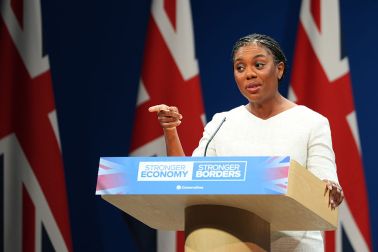The British are a generous people. We donate more to humanitarian causes than anyone else in Europe, and by some margin. The average Brit gives twice as much as a Norwegian, three times more than a Belgian, six times more than a German and seven times more than a Frenchman. All told, British households send about £4 billion a year to overseas charities — more than any people in the world, in fact, apart from the Americans. So it is by no means clear why David Cameron believes that, in the middle of a fiscal crisis, he should extract a further £4 billion from us through the tax system and give the money to charities of his choice.
The British are a generous people. We donate more to humanitarian causes than anyone else in Europe, and by some margin. The average Brit gives twice as much as a Norwegian, three times more than a Belgian, six times more than a German and seven times more than a Frenchman. All told, British households send about £4 billion a year to overseas charities — more than any people in the world, in fact, apart from the Americans. So it is by no means clear why David Cameron believes that, in the middle of a fiscal crisis, he should extract a further £4 billion from us through the tax system and give the money to charities of his choice.
It is now three years since the Prime Minister decided that the amount of tax money sent to foreign charities should double. At that time, the Conservatives were obsessed by ‘brand decontamination’, and signing up to Labour’s spending target on international aid — that the tax money sent abroad should equal 0.7 per cent of economic output — seemed a good way to show they cared. It is amazing how generous politicians can be with other people’s money.
The snag is that, as Liam Byrne put it when he left the Treasury, ‘There’s no money left.’ This message still does not seem to have sunk in to certain parts of our government. From Sweden to New Zealand, governments have cut overseas donations on the basis that they cannot give away money they do not have. But the aid pledge has been robustly protected by Andrew Mitchell, who is (alas) one of the most effective operators in the Cabinet. Foreign aid is the Conservatives’ only spending pledge, he told George Osborne as the economic crisis emerged. If we abandon it, what does that say about our resolve? It proved a winning argument.
Now, however, different questions are being asked. The extra cash given to Mitchell’s Department for International Development is broadly equivalent to the money taken away from the Ministry of Defence. This seems an odd arrangement for a country trying to win a war in Afghanistan. What does it say about Britain’s idea of itself in the world?
Moreover, where will Mitchell’s department dump the cash? Its officials have to deal with a 30 per cent budget rise over a year, in order to hit the soon-to-be-legally-binding spending target by 2013. A mild panic has set in. In Whitehall, it is rumoured they may end up wiring billions to the World Bank, which would spend the money without acknowledging its source. The cash may well end up back in China, whence it was probably borrowed in the first place. In a time of supposed fiscal austerity, this is madness.
The chief recipient of British international aid is India. Yet our former colony is now rich enough to afford a space programme, a nuclear programme and even its own foreign aid programme. Britain may disagree with New Delhi’s spending priorities, but we gave up the right to influence them in 1947. So we end up with the bizarre spectacle of the British Prime Minister begging India for a greater slice of its booming economy with one hand, while handing it alms with the other. Meanwhile the BBC Hindi service is being reduced to one hour a day, abandoning its 10 million listeners, to save just £1 million a year. DFID now intends to sink that sum into India every single day.
As Liam Fox said in his leaked letter this week, it makes no sense for the government to pass a law binding itself to Labour’s aid spending target. The ability to change your mind is useful in politics, especially if it is obvious that you have made a mistake. The Chancellor himself has noticed that, when he takes questions on radio phone-ins, he is challenged over the soaring aid budget. Yes, the Gaza Strip needs help. But male life expectancy there is higher than in the city of Glasgow.
David Cameron has missed a trick. By all means stick to the target, that Britain should give at least 0.7 per cent of its economic output in foreign aid. But by Britain he should include private donations as well as state donations. This would reveal a figure of 0.8 per cent, according to the Hudson Institute’s Index of Global Philanthropy. There is no need to pass a law or further raise taxes. Britain has met its aid target already. It has done so by sums collected in envelopes in churches, at fêtes, raised in charity shops. This is a tradition of British philanthropy that pre-dates the welfare state. But the government’s agenda of doubling overseas aid seeks to nationalise charitable giving — surely the very antithesis of the Big Society.
Cameron is lucky enough to be Prime Minister of one of the most generous countries on earth. He should recognise that fact, and freeze the aid budget. Britain’s philanthropy does not need to be topped up by the state. Using the tax system to collect charitable donations suggests that politicians do not trust the people. Such feelings can quickly become mutual.





Comments